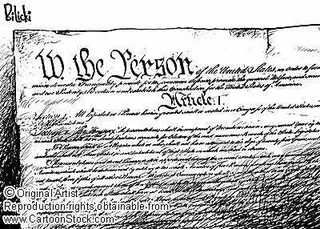Until now, I have generally been opposed to an investigation of the Bush administration, but a man I respect, Paul Krugman, and a man who makes my skin crawl, Keith Olbermann made strong cases for pulling back the curtain and taking a look at the Bush years.
From Paul Krugman:
I’m sorry, but if we don’t have an inquest into what happened during the Bush years – and nearly everyone has taken Mr. Obama’s remarks to mean that we won’t – this means that those who hold power are indeed above the law because they don’t face any consequences if they abuse their power.
Let’s be clear what we’re talking about here. It’s not just torture and illegal wiretapping, whose perpetrators claim, however implausibly, that they were patriots acting to defend the nation’s security. The fact is that the Bush administration’s abuses extended from environmental policy to voting rights. And most of the abuses involved using the power of government to reward political friends and punish political enemies.
SNIP
Meanwhile, about Mr. Obama: while it’s probably in his short-term political interests to forgive and forget, next week he’s going to swear to “preserve, protect, and defend the Constitution of the United States.” That’s not a conditional oath to be honored only when it’s convenient.
And to protect and defend the Constitution, a president must do more than obey the Constitution himself; he must hold those who violate the Constitution accountable. So Mr. Obama should reconsider his apparent decision to let the previous administration get away with crime. Consequences aside, that’s not a decision he has the right to make.
And here is Keith Olbermann’s “Eight Years in Eight Minutes” (actually nine minutes and 27 seconds):
Whether he lied or not, the intelligence was there and we went to war. To put this all on Bush is intellectually dishonest. But this isn’t just about the war. It’s about crony politics. It’s great that Alberto Gonzalez resigned as Attorney General, but if the accusations against him were true, that he fired attorneys because they prosecuted Republicans (or refused to prosecute Democrats), that is an abuse of power and a resignation is not enough.
Beyond that, we can’t reform our government to prevent these abuses from happening again if we don’t know what happened. In a compelling Op-ed in the Washington Post, Rep. John Conyers put it best:
We cannot rebuild the appropriate balance between the branches of government without fully understanding how that relationship has been distorted. Likewise, we cannot set an appropriate baseline for future presidential conduct without documenting and correcting the presidential excesses that have just occurred. After the Nixon imperial presidency, critical reviews such as the Church and Pike committees led to fundamental reforms that have served our nation well. Comparable steps are needed to begin the process of reining in the legacy of the Bush imperial presidency.
SNIP
Some day, there is bound to be another national security crisis in America. A future president will face the same fear and uncertainty that we did after Sept. 11, 2001, and will feel the same temptation to believe that the ends justify the means — temptation that drew our nation over to the “dark side” under the leadership of President Bush and Vice President Cheney. If those temptations are to be resisted — if we are to face new threats in a manner that keeps faith with our values and strengthens rather than diminishes our authority around the world — we must fully learn the lessons of our recent past.
I think that a legitimate case can be made for investigating certain events in the Bush administration. Unfortunately, it seems like the loudest voices on the left are those calling forimpeachment or war crimes indictments. As Paul Krugman, Rep. Conyers, and Keith Olbermann point out, this isn’t just about the war. It’s about a whole lot more.
What do you think? Do we bury the past or face it?
[poll id=”
28
“]

73 comments